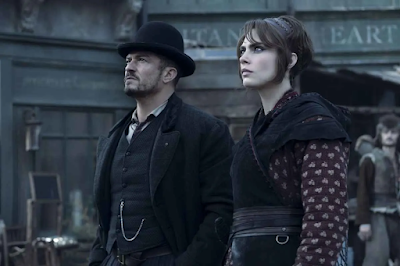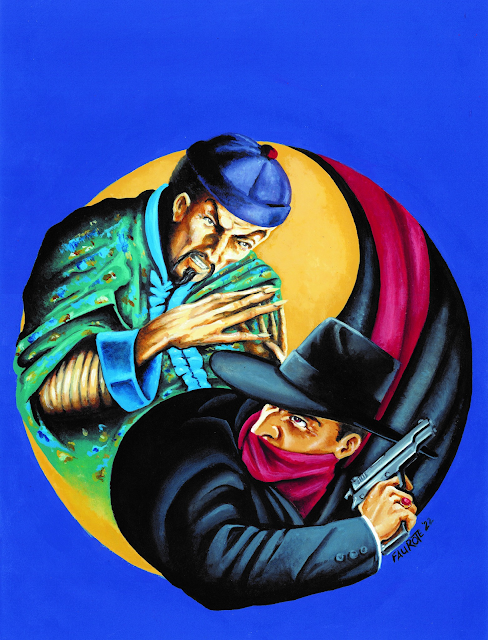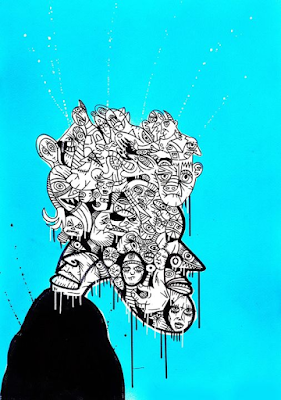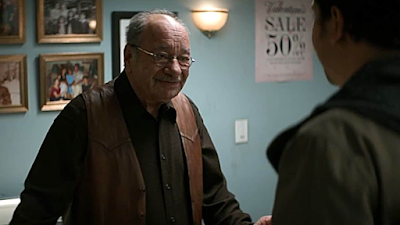It took forever and a day for Amazon Prime/Travis Beacham/Rene Echevarria's Carnival Row: Season 2 to surface, and for one such as myself (an unapologetic, workin' bloke), longer than usual to view it. There's been a lot discussed on the sequel's content and its Tolkien-esque, steampunked/Industrial Age Burgue, so I see no need to rehash the whole of it, except to say that Carnival Row 2 (like its predecessor) is at times a parallel-history, Sherlock Holmes, turn-of-a-different-century adventure, with murders having occurred among its faeries and the like (i.e., its various, mythology-sprung population). Orlando Bloom's Rycroft Philostate, a human-fae cop, investigates such, with shades of bigotry rising, as he partakes in an amorous relationship with Cara Delevigne's Vignette Stonemoss, a comely, winged lass who ultimately joins a resistance (overthrow-the-status-quo) Black Raven group.
But to me, Carnival Row's crusty core is more a variant of Alien Nation, Planet of the Apes, Bright, District 9, Lord of the Rings, and well, I'm sure you get the drift. In this respect, it insinuates matters that we see around us today, though set in a Twilight Zone-ish mode to make us twist our brains and say, "Hey, oh, I get it."
The series' most fascinating aspect (and a huge, Season 2 component) is its be-wary-of-socialism/communism motif. David Gyasi's Agreus, a responsible sort of Pan, and his impassioned, human lady, Tamzin Merchant's Imogen Spurnrose, go on the lam because of their "brash" relationship and to find a haven that turns out to be anything but that. It is, in truth, a Fidel Castro (cloaked-for-propaganda) ruse, run by the reputed "freedom fighter", Joanne Whalley's glib, broken-horned Leonora. Miss Spurnrose's brother, Andrew Gower's Erza also finds himself in the conflicting mess of promise and threat, and the results are nothing short of heartbreaking, though for the more astute, likely to incite righteous rage, as any set of lies would and should.
Carnival Row (both seasons linked) is pretty damn violent, as well (in particular in the beheading and messy-autopsy departments, and the shifty, EC-brewed Sparas comprise a whole other repugnant deal). As led by Bloom's "Philo", the series spews a profane, tough-guy/yank-the-innards-out slant, which will rub some of today's militant pacifists (ha ha) the wrong way, but those who don't dig pistol-packin' grit, factory-sweatin' grime and courageous, sacrificial death (with shameless carnage of the Tom Savini/Steve Johnson/Herschell Gordon Lewis ilk) should seek their entertainment elsewhere. Carnival Row, even if faerie-drenched, ain't no sissified affair, and thanks to Beacham, Echevarria and co-producer Bloom, its ambiance seems proud of that fact.
Amazon doesn't intend to extend this series, though I could see fans urging movie follow-ups. Even if it languishes a few years (even decades, by chance), my hunch is that its thought-provoking foundation will spawn a comeback some day. Though Carnival Row may be too superfluous in characterization and ideology to please the current, polarized masses, it offers the seeds for revisited rumination and even greater, fantasy fermentation. (In other words, it holds a loyal enough audience, and that ensures reinspection farther down the sentimental, alternate-reality row.)





















































